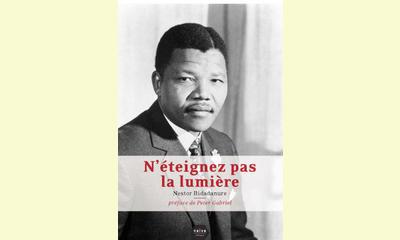|
|
Do not turn off the light - a book review
un article par Sodis, Editions Gallimard
"It was during the 30s, in a pro-Nazi organization
called Ossewa Brandwag (the Oxcart Sentinel) that
the three precursors of apartheid. John Vorster ,
Verwoerd Hendrik Frensch and Daniel Malan met and
shared two sinister dreams. The first was to take
power to avenge the British rule over the
Afrikaners. The second was to make a
hierarchical racial system in which blacks would
be further marginalized. To achieve these
objectives, these men needed two key levers : a
shared vision of the world, a doctrine, a
political party to mobilize the mass of whites.
The system of apartheid thus became the doctrinal
response and the National Party 's instrument of
propaganda, organization and conquest of powe.
But what is the meaning of apartheid? What is the
real meaning of the doctrine?"

click on photo to enlarge
"Do not turn off the light" is a book of
reflections on the thought of Nelson Mandela. It
analyzes the conditions for the emergence of his
political personality as well as his legacy for
future struggles. The light symbolizes culture in
the progressive and humanist sense. It springs
from traditional education, the African philosophy
of Ubuntu, the willingness to learn and the
conclusions that the hero of the struggle against
apartheid draws from each political struggle .
Mandela believes that every human being can better
himself, and that education raises the human
condition and makes people free. To survive the
harsh conditions of imprisonment, Mandela and his
companions put in place a strategy of resolute
resistance. Neither terror nor subhuman prison
conditions designed to break the morale of the
prisoners could defeat the freedom fighters .
The author, Nestor Bidadanure, is a journalist and
specialist in conflict resolution. He contributes
to the magazine Afrique-Asie . He is the author of
the books "Cultures of peace versus populism" and
Memoirs of the future" in the "Naive" editions
(2011).
(Click here for a French version of this article)
|








|
DISCUSSION
Question(s) liée(s) à cet article:
What is the legacy of Nelson Mandela for us today?,
* * * * *
Commentaire le plus récent:
ON MANDELA'S LASTING LEGACY
In death, as in his life, Nelson Mandela has captured the imagination of the world. Mourning mixed with celebration has electrified crowds all over South Africa and elsewhere. His life’s achievements and his lasting legacy are the topics of discussions. He has been described as a great warrior, a great liberator, the last giant in the fight against colonialism, forgiver, peace maker, and in many other ways.
All this week, Mandela’s lasting legacy has been on my mind. We tend to capture the legacies of great men and women in a word or two. A scientist becomes famous for an important discovery, a writer for a famous book, a musician for a great composition, and so on.
People like Mandela fall in a different category. He is in the category of Mahatma Gandhi and Dr. Martin Luther King. . ... continuation.

|
|









